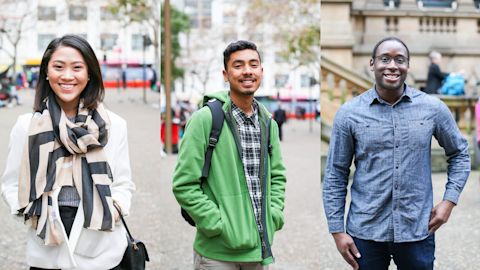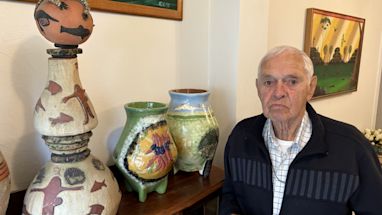More than 178,000 international students each year study in Sydney, bringing huge benefits to our local culture and economy.
But the pandemic has highlighted just how vulnerable these students are.
Charlotte Long, Head of International Student Experience at UNSW Australia says the security and prosperity of most international students in Australia has always been tenuous.
“International students come to Australia with so much bravery, so much resilience,” Long says. “The cultural diversity and cultural linkages they bring to our country empowers our own community so much.
“International students tend to sit outside of a lot of the protections that are part of the social framework for most other groups, and Covid-19 has really highlighted this.”
The international student population that contributes $5.8bn a year to the Sydney economy now finds itself largely without work. Many have insecure housing, rely on food aid and are isolated from their personal support networks.

“I’m fortunate I have my husband here with me,” says Sarina Manadhar, originally from Nepal and now one of the City of Sydney’s international student ambassadors. “I have someone to talk to. But I know people who are suffering terribly – without work, without money, worried about family back home but unable to return.”
It takes a range of services to address this challenge. The City of Sydney has provided grants to organisations including Redfern Legal Centre, which has operated a free international students assistance service for the past 9 years, aiding around 700 students in 2019.
Students' legal issues are dominated by three main areas of disputes
“The three biggest issues we’re seeing now are the same three that have always been dominant,” says Sean Stimson, solicitor with the Redfern Legal Centre.
“These are housing disputes, employment related issues and disputes with education providers. But the scale of demand for assistance around these issues is greatly increased.”
At the start of the pandemic, the Redfern Legal Centre saw an influx of disputes around housing.
“Many landlords attempted to evict international students, out of fear they wouldn’t be able to meet their rental commitments,” explains Sean Stimson.
For now, there is some temporary housing security, with a NSW Government moratorium preventing landlords from evicting tenants for rent arrears. “There’s a lot of anxiety about what will happen once the moratorium ends, and what this will mean for renters.”
The pandemic recession has badly hit the industries which have traditionally been strong employers of international students, such as hospitality. And as temporary visa holders, international students are not eligible for the JobKeeper of JobSeeker payments, leaving them with few options.
“My working hours were reduced, and my husband was made redundant,” says Sarina Manandhar. “I was able to access my superannuation which has helped, but most students will not have that option, especially those who arrived at the start of Covid and who generally will not have any savings.”

“There’s a perception that many international students have wealthy families who can offer them support, but Covid-19 has changed things,” says Sean Stimson. “We don’t appreciate how fortunate we are here in Australia. The situation in other countries is far, far worse, and many families who were once in a position to support their children overseas are now financially struggling and support has evaporated.”
The flow on effect is that students can’t afford tuition, leading to the collapse or closure of many small educational institutions that previously serviced international students.
This in turn puts additional pressure on students, who must find enrolment in alternative, equivalent study to maintain their visa. “It’s incredibly problematic – a visa is not an open-ended thing, so even if students re-enrol, their visa may not cover the entire period of their tuition,” explains Sean Stimson.
The My Legal Mate app offers equitable access to legal advice
The City of Sydney’s grant to the Redfern Legal Centre has been used to support free access to My Legal Mate, an app that provides individualised legal advice and resources to students.
“The numbers of students we’re seeing are just the tip of the iceberg, which is why My Legal Mate is so important right now, as it allows far more students to access legal resources,” says Sean Stimson. “The road map of legal issues that students face often follows the same path, and we know that many students are comfortable with self-managing their disputes once they have the resources.”
The City of Sydney’s grant, in conjunction with Study NSW, has made access to My Legal Mate free for international students across the state until June 2021.
Coordinate, culturally appropriate casework
The complex challenges facing international students is at the core of another program, also supported by the City of Sydney – the International Student Outreach Project.
Colette Slaviero, International Student Support Officer at the University of Sydney, says a lot of smaller colleges don’t have support frameworks like this in place.
“There previously wasn’t a community service that was coordinated, culturally appropriate or cognisant of international students’ visa requirements, Colette Slaviero says.
Charlotte Long agrees. “Early in the pandemic we began to hear reports from food banks and homelessness services about an increase in student presentations, but there was no conversation being had or data being collected.”
The international student outreach project aims to fill that void, giving people at the frontline of support services a single point to refer students to for assistance.
“Some students will just need a welfare check-in, others may need help applying for emergency housing, or more complex issues,” says Slaviero. It’s hoped the program will outlive the pandemic too, as these issues have always been a part of the international student experience to varying degrees.
Empowering students to be leaders in their communities
For the Sydney Alliance – another organisation that has received grant funding from the City of Sydney – support efforts for international students are focused on empowerment and community organising, rather than emergency relief.
Sydney Alliance runs listening sessions, where students can tell their story in a safe environment. The aim is to make students aware they’re not isolated, and that their experience is shared, and to help students to action to address the issues they are facing.
“We see students facing work exploitation and fee exploitation with education providers,” says Diana Olmos of the Sydney Alliance. “Many students come to us in survival mode, but we help them become leaders, so they can support their own communities.”
The issue of trust between students and the government is not widely acknowledged, says Diana Olmos. “Many feel that the Australian government has welcomed them when times were good and they could pay full fees, but turned their back when the students need government help the most.”
The Sydney Alliance aims to build trust between international students and government-backed relief efforts in this context and help them access services. “We’re not affiliated with government,” explains Diana Olmos, “so students feel comfortable bringing their issues out into the open. They also see a different side to Australia in these sessions, not just our Prime Minister saying that if international students can’t support themselves, they should leave.”
As long as the pandemic continues, the broader population can play a role by ensuring international students feel supported and speaking up when they see hostility or racism.
“There are some people who feel ‘they should go back, they don’t belong, our country should focus on our own people’,” says Sarina Manandhar. “That’s very hurtful, which is why it’s important to help international students feel supported socially, to include them wherever possible, check in on them and ask how they’re going.”
Contacts for international student support
Email for more information about the international student outreach project or to access assistance.
See Sydney Alliance for support focused on empowerment and community organising for international students.
And visit Redfern Legal Centre for free legal assistance for international students.
Published 9 October 2020, updated 18 April 2024



